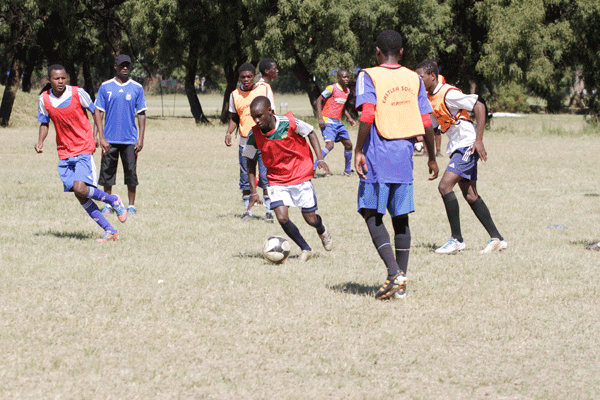
Have you ever watched young children playing soccer? They tear around the field expending an enormous amount of energy, all in a noisy, frantic desire to get the ball. It often seems like they have no real idea in what direction they are going but they seem only focused on getting the ball — and once they have got it they want to keep hold of it for as long as possible.
by Tim Middleton
Some simply kick out aimlessly at the ball for the simple pleasure of making contact with the ball, thinking they have achieved something by doing that. A good coach will have to get in there quickly to help them realise that they must play as a team and to work together for the common good.
In truth, it should not be too difficult for the coach to pass on his message. All he has to do is to consolidate his message into three short words, all beginning with the letter “G”. It all comes down to them remembering to do three things: Get! Give! Go! If they can learn and apply these three things, it will enable the team to be more effective, successful, fruitful and progressive.
The first thing to learn is: Get! However, the problem is that even such a simple piece of advice is misunderstood by many. Most people think that you are meant to get the ball but that would be to miss the point. Such folk would argue that you can do nothing without the ball so you must get the ball. That is only half true, though – it is true that the team can do nothing without the ball, but the individual can do a great deal without the ball, for the benefit of the team as a whole for the bigger picture. The individual must get in a position to receive the ball — that is a big difference!
The second piece of advice the coach should give, once the player has got in a position whereby he has received the ball, is: Give! Young children all want to run with the ball once they have got it — they want to dribble it round and round. Sadly, what they do not realise is that the ball travels much faster if it is passed. The player’s first thought should be to pass the ball, to give.
The third piece of advice is equally simple: Go! Once the player has passed the ball he should run to get in a position to receive the ball again — he must go for the return. As children get a little older (and lazier), they pass the ball and then stand back thinking that their work is done. They need to give the ball and go — again, not necessarily to receive the ball but somewhere else so that the opposition has to think about what is happening. They need to repeat the cycle of “Get, Give, Go”.
The point of this article is obviously not to share coaching tips about soccer, but to consider educational matters. The truth is that the same tips used by such a soccer coach apply to school and to life in general, for children and adults. These are truths we must teach, and indeed model for our young people. As we considered last week the need to serve, we see it this week in the context of a team, of a business, of a family, of a community or of a country. We need to learn to help others.
- Chamisa under fire over US$120K donation
- Mavhunga puts DeMbare into Chibuku quarterfinals
- Pension funds bet on Cabora Bassa oilfields
- Councils defy govt fire tender directive
Keep Reading
In life, young people must learn not to “chase the ball” for themselves but learn the value of getting into a position whereby they (and others) can take advantage of the opportunities presented, for the sake of the “team”. They must not wait for opportunities to come to them on a plate, nor chase around wasting energy doing things for themselves, getting in each other’s way. They must learn to work as a team, trusting each other. They must learn to serve the greater good.
Young people must learn the value of giving, just as the joy of playing with a Frisbee is in throwing it, in giving. They must learn to give. Some people think that this means giving an odd dollar to a beggar but it is not just money that people must give nor indeed their opinion but they need to give of their time, effort, thought and expertise for the benefit of the team, the community, the country.
Thirdly, young people must learn to go and serve again — not to sit back on their laurels, thinking they have done their part or done well. They must be prepared to go wherever is helpful. They must be willing to go, to cover for a team-mate, to take pressure from a colleague, to assist a neighbour.
What sort of team could this country be if we all taught and modelled these principles? Sadly, we are more like that group of children described in the first paragraph. It is time for us all to get, to give and to go; if we have got this message now, then give it and go for more.
Tim Middleton is the executive director of the Association of Trust Schools and author of the book on “failure” called Failing to Win.
email: [email protected]
website: www.atschisz.co.zw










